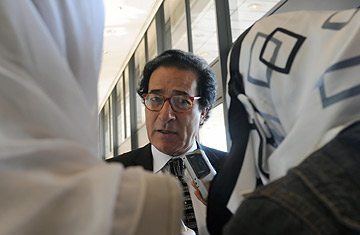
Farouk Hosni, Egypt's controversial candidate for the UNESCO director general position.
Egyptian Culture Minister Farouk Hosni's bid to take over a major United Nations organization is falling apart thanks to charges that his past comments on Israel indicate he's an anti-Jewish bigot — and therefore unfit for the post.
Though long considered the favorite to win the position of Director General at the United Nations Educational, Scientific, and Cultural Organization (UNESCO) in Paris, Hosni's chances of winning that role later this month have been hit by an international campaign launched earlier this year. It began with a boom last May, when French writer Bernard-Henri Lévy, Holocaust survivor and Nobel Peace Prize winner Elie Wiesel, and French film director Claude Lanzmann authored an editorial in Le Monde accusing Hosni of being a "dangerous man" who'd been responsible for a series of "insane declarations" regarding Israel and Jews.
Those statements, the writers argued, represent an "anthology of hate and error" and a "frenzy of conspiracy theories" that should disqualify Hosni from the UNESCO job considered "one of the most important posts of cultural responsibility on the planet".
The most notorious of Hosni's comments came during an angry exchange last May with Muslim Brotherhood legislators who suggested the Minister was softening on previously stated hostility to cultural exchanges with Israel. "I'd burn Israeli books myself if I found any in libraries in Egypt," Hosni spat back.
The chorus of voices opposing Hosni's candidacy is growing. In August, an article in Foreign Policy magazine called him a mouthpiece for "rampant Judeophobia" among Egyptian elites. "To say that Farouk Hosni doesn't much like Israel is putting it lightly," the piece began.
As a result of such comments, the number of countries which plan to support Hosni's UNESCO bid have thinned, and eight other rivals have stepped up.
A successful painter with a reputation as a social and cultural liberal, Hosni has spent a good part of his time since the protest movement began explaining and apologizing for his comments. On his blog, he argues that the book burning statement was intended as a hyperbolic retort expressing exasperation with his accusers. Still, he acknowledges such public statements are hard to rationalize. "I clearly regret the words said and which I could have justified as being uttered under the tension and provocation of the discussion at the time," Hosni writes. "However, I will not take that as an excuse. They were shocking, and I understand that."
That's not likely to placate the anti-Hosni front, but some observers say his opponents are attacking a symptom rather than the disease. Five Middle East specialists contacted to speak about the flap made the same central point: Hosni's comments are anything but unusual in the political settings in which he made them. (None of the analysts — academics, think tank researchers and one diplomat — would go on the record with their views, pointing to the explosive nature of the controversy.) "This is certainly not excusing them, but the kinds of [anti-Jewish], anti-Israel comments attributed to Hosni are the lingua franca of Arab political and cultural elites," says one Middle East expert. "Virtually none of it would be used in polite, international company, but officials who fail to use such terms to friendly or domestic audiences won't get much of a hearing."
Indeed, as Hosni has rushed to explain or reject his inflammatory comments abroad, Egyptian officials and cultural figures have sounded alarmed at him going soft. "I am angry with him," Egyptian poet Abderahman al-Abnudi recently wrote in the pro-government magazine Al-Mussawer. "The fact that he apologizes in this manner fills me with deep sadness."
Hosni has little choice. Egyptian President Hosni Mubarak wants an Egyptian as the head of a U.N. body as a matter of national pride — and has reportedly applied diplomatic pressure on the U.S. and France to back Hosni. Geopolitics is also probably behind the attitude of hardline Israeli Prime Minister Benjamin Netanyahu, who has said he would not block Hosni's election. That move is likely to be part of an array of horse-trading necessary to find an eventual Israel-Palestinian peace agreement all Middle Eastern nations will adhere to.
